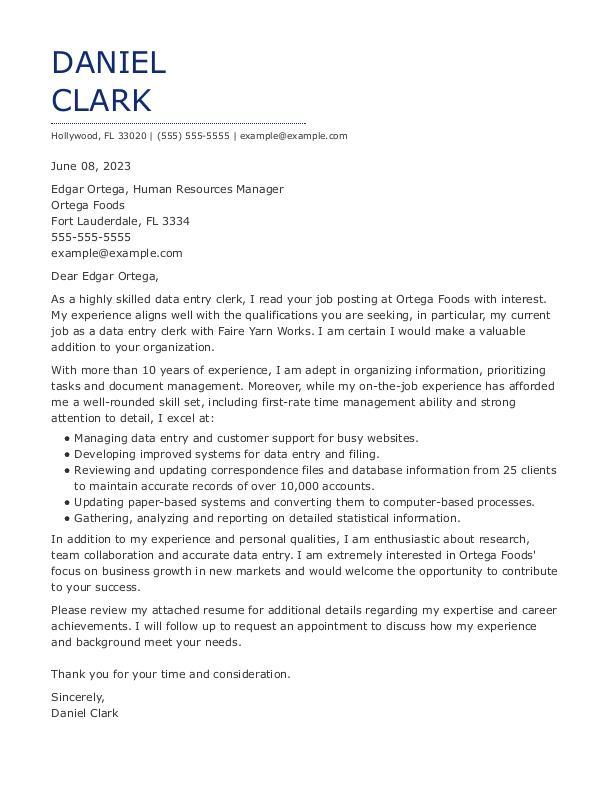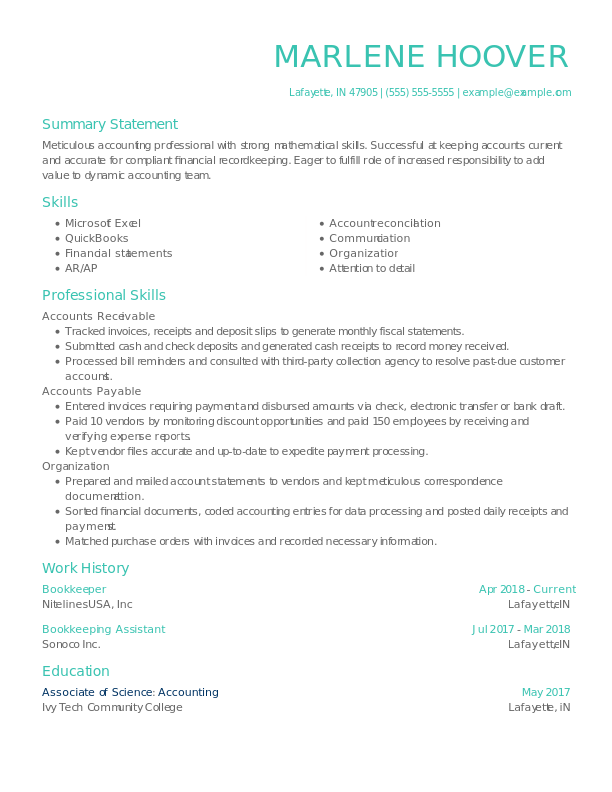Why this resume works
- Highlights industry-specific skills: Highlighting specific administrative skills showcases a robust background in managing large datasets, organizing files, and training new hires.
- Quantifies accomplishments: The resume quantifies accomplishments by detailing metrics such as managing over 10,000 records with 99% accuracy and improving retrieval time by 20%.
- Uses action-oriented language: Action verbs like “managed,” “organized,” and “conducted” are used throughout to effectively engage the reader and demonstrate genuine contributions.
More Data Entry Clerk Resume Examples
Take a look at more administrative resume examples to see the best ways to highlight your attention to detail, typing speed, and accuracy, among other skills.
Facilities Manager
Why this resume works
- Downplays education section: When you’re as advanced in your career as this applicant, the education section can take a backseat. Instead, the space is devoted to an impressive work history and skill set.
- Mentions certifications: Badges like Certified Facility Manager and Building Operator Certification illustrate this job seeker’s commitment to developing new skills and continuous learning.
- Shows digital literacy: References to managing maintenance budgets and implementing security protocols also show considerable computer skills, essential to modern workplace readiness.
Executive Assistant
Why this resume works
- Includes mix of soft and hard skills: This resume presents a balanced skill set, blending technical tasks like data management with interpersonal skills such as team supervision and event coordination.
- Demonstrates language abilities: Language skills in English, Spanish, and French indicate strong cross-cultural communication skills, essential for handling international projects and diverse client interactions.
- Displays technical expertise: Showcasing certifications in project management and administrative professionalism highlights the candidate’s technical expertise and readiness to handle specialized tools and industry standards.
Assistant Manager
Why this resume works
- Showcases impressive accomplishments: The resume shows impressive accomplishments through numbers, such as boosting sales by 15% and improving team performance by 20%, highlighting senior-level influence.
- Focuses on work history: A chronological resume format effectively highlights work history, with clear progression from customer service lead to assistant manager, perfect for showcasing a seasoned career path.
- Emphasizes leadership skills: Numerous leadership examples are evident, including managing teams to achieve significant improvements in sales and cost efficiency, demonstrating strong leadership capabilities throughout the resume.
Data Entry Clerk Resume Template (Text Version)
Christian Rivera
Jersey City, NJ 07306
(555)555-5555
Christian.Rivera@example.com
Professional Summary
Experienced data entry clerk with a record of 99% accuracy. Proficient in database management with skills in Office Administration, boosting data efficiency by up to 30%.
Work History
Data Entry Clerk
DataMasters Inc. – Crestwood, KY
June 2022 – March 2025
- Managed 10,000+ records with 99% accuracy.
- Exceeded data entry speed by 15% each quarter.
- Ensured timely updates of client database.
Office Assistant
Clerks United – Crestwood, KY
May 2019 – May 2022
- Organized files improving retrieval time by 20%.
- Assisted in processing 500+ invoices weekly.
- Conducted data entry audits, reducing errors by 25%.
Administrative Support Specialist
AdminCo Solutions – Louisville, KY
May 2017 – April 2019
- Maintained records database for 50+ projects.
- Trained 5 new hires on data entry protocols.
- Monitored data entry tasks, boosting efficiency by 30%.
Skills
- Data Entry
- Database Management
- Office Administration
- Microsoft Office
- Attention to Detail
- Time Management
- Data Analysis
- Customer Service
Education
Master’s Degree Business Administration
Harvard University Cambridge, MA
June 2017
Bachelor’s Degree Information Technology
New York University New York, NY
June 2015
Certifications
- Certified Data Professional – Data Management Association International
- Microsoft Office Specialist – Microsoft
Languages
- English – Beginner (A1)
- Spanish – Beginner (A1)
- French – Intermediate (B1)
Popular Skills for a Data Entry Clerk Resume
Creating a strong resume skills section is essential for a data entry clerk. Highlighting technical abilities, such as typing speed and accuracy, alongside soft skills like attention to detail and time management, is vital for success in this position.
Below are a few of the top soft skills frequently listed on data entry clerk resumes in our database.
| Soft Skills | % of resumes with this skill |
|---|---|
| Accuracy and attention to detail | 61% |
| Independent worker | 25% |
| Customer service-oriented | 24% |
| Strong problem solver | 22% |
| Maintains confidentiality | 18% |
Here are a few examples of hard skills frequently listed on data entry clerk resumes.
| Hard Skills | % of resumes with this skill |
|---|---|
| Data entry | 57% |
| Data accuracy | 46% |
| Fast typing speed | 45% |
| Office administration | 22% |
| File management | 17% |
Related Resume Guides
- Administrative Front Desk Clerk
- Administrative Officer
- Assistant Front Office Manager
- Auto Title Clerk
- Bank Clerk
- Bilingual Receptionist
- City Clerk
- Contract Administrator
- Desktop Support Engineer
- Document Controller
- Document Specialist
- Excel Professional
- Executive Assistant
- Facilities Coordinator
- Facilities Manager
- Front Office Assistant
- Front Office Executive
- Gym Receptionist
- Medical Billing And Coding Specialist
- Medical Billing Professional
- Medical Office Assistant
- Medical Receptionist
- Non Profit Administrative Assistant
- Office Assistant
- Office Manager
- Personal Assistant
- Procurement Analyst
- Procurement Officer
- Procurement Specialist
- Receptionist
- Secretary
- Store Assistant
Advice for Writing Your Data Entry Clerk Resume
Need to write a resume for a data entry clerk job? I’ll show you how to make a resume that highlights your attention to detail, fast typing skills, and data management abilities. Whether you’re new to the field or updating your resume, these tips will help you stand out.
Highlight your most relevant skills
When applying for a data entry clerk position, listing relevant skills is crucial. It helps employers quickly see that you have the specific abilities needed for the job.
In your dedicated Skills section, list hard skills like data entry software proficiency, knowledge of spreadsheets, and familiarity with database systems alongside soft skills such as strong organizational abilities and effective communication. This mix shows that you are well-rounded and capable of handling various tasks.
Additionally, integrate these key skills into your work experience section for a stronger impact. For example, mention how your fast typing speed improved efficiency at a previous job or how your attention to detail reduced errors in data entry tasks. By doing this, you provide concrete examples that demonstrate your capabilities as a data entry clerk.
To get past ATS and catch recruiters’ eyes, include keywords on your resume directly from the job listing. This is your chance to stand out from other qualified applicants.
Showcase your accomplishments
Organize your work experience in reverse chronological order, starting with your most recent job. For each job, include the job title, employer name, location, and employment dates. This helps employers see your most recent experience first.
When describing your accomplishments, focus on quantifying them. Instead of just listing duties like “entered data into database,” turn this into a measurable achievement: “Entered 500 records per day with 99% accuracy.” Use numbers to show how you improved processes or saved time.
Using action words like “improved,” “implemented,” or “achieved” makes your resume more dynamic. Quantified accomplishments help hiring managers quickly understand your impact and skills. Highlighting these measurable results will make you stand out as a candidate who delivers real value.
5 data entry clerk work history bullet points
- Entered and maintained accurate data for over 1,000 customer records per week, ensuring up-to-date information in the database.
- Verified and corrected data discrepancies across multiple spreadsheets, reducing errors by 25%.
- Streamlined data entry processes by implementing new software tools, increasing efficiency by 20%.
- Collaborated with cross-functional teams to ensure timely and accurate reporting, resulting in a 15% improvement in report turnaround time.
- Trained and mentored new hires on data entry protocols, enhancing team productivity by 10%.
Choose a resume template that has clear headings and readable fonts. Steer clear of excessive colors or intricate designs that may complicate the readability of your details.
Write a strong professional summary
A professional summary is a short statement at the top of your resume that highlights your key skills and experiences. For a data entry clerk, your summary should quickly captures the employer’s attention and shows your ability to handle the job’s requirements, setting the tone for the rest of your resume.
Those with more limited experience should choose a resume objective. Objectives are better at focusing on the future and outlining your career goals. Be sure to use action-oriented language such as “accurately inputted data” or “efficiently managed records” to demonstrate your impact.
When writing this section, focus on listing your most relevant skills like typing speed, attention to detail, and proficiency with data entry software. Clearly organize this information so that even a quick glance reveals why you are suited for the role.
Data entry clerk resume summary examples
Entry-level
Detail-oriented data entry clerk with a bachelor’s degree in Information Technology and certification in Microsoft Office Suite. Proficient in data entry software, maintaining accurate records, and ensuring data integrity. Eager to apply foundational skills in a professional setting while contributing to organizational efficiency and accuracy.
Mid-career
Experienced data entry clerk with over 5 years of expertise in managing data for financial institutions. Adept at quickly entering high volumes of data, performing quality checks, and maintaining confidential information securely. Known for excellent attention to detail, the ability to work under pressure, and proficiency with various database management systems.
Experienced
Seasoned data entry specialist with more than 10 years of experience leading data entry teams across multiple industry sectors. Demonstrated excellence in improving data entry processes, implementing new software solutions, and training staff on best practices. Proven track record of enhancing data accuracy by 30% through innovative strategies and meticulous attention to detail.
Data entry clerk resume objective examples
Recent graduate
Detail-oriented and highly organized recent graduate with a diploma in data entry operations seeking an entry-level data entry clerk position. Eager to apply strong typing skills, accuracy, and attention to detail to support data management tasks and contribute to the company’s operational efficiency.
Career changer
Dedicated professional transitioning from customer service to data entry, bringing excellent communication skills, a keen eye for detail, and proficiency with Microsoft Office Suite. Seeking a data entry clerk role to leverage transferable skills while gaining hands-on experience in data management.
Specialized training
Meticulous individual with specialized training in database management and certification in advanced Excel techniques. Looking for an entry-level data entry clerk position where I can utilize my technical skills and passion for organizing information to ensure accuracy and integrity of company databases.
Create a standout resume fast with our Resume Builder. Builders walk you through the entire process from beginning to end, offering plenty of tips and tricks along the way.
Match your resume to the job description
Tailoring your resume to match a job description is crucial for standing out from the pack. Employers use applicant tracking systems (ATS) to filter resumes, so using the right keywords can make a big difference. Start by carefully reading the job posting and highlighting key terms and phrases that describe the skills, qualifications, and responsibilities they are looking for.
Once you have identified these keywords, incorporate them naturally into your resume. For instance, if the job posting mentions “data accuracy,” ensure your resume highlights your attention to detail in maintaining accurate records. If “proficiency in Microsoft Excel” is listed, specify your experience with Excel in both your skills section and work history.
For example, if the job posting states: “Maintain accurate data records and perform regular updates,” you could reword this into a resume bullet point like: “Ensured accuracy of data records through regular updates and careful review processes.” This not only mirrors the language of the job ad but also demonstrates that you have performed similar tasks effectively.
By aligning your resume with the job description, you increase your chances of creating an ATS-friendly resume that makes it past the filters and into the hiring manager’s hands.
Our ATS Resume Checker helps your resume get noticed by finding mistakes and giving you advice to fix them.
FAQ
Do I need to include a cover letter with my data entry clerk resume?
When applying for a data entry position, adding a data entry cover letter to your resume can be a real advantage. Cover letters allow you to showcase your keen eye for detail, dedication to precision, and proficiency in handling extensive datasets — essential skills for the job.
Use cover letter examples to illustrate why you’re drawn to the company and how your background matches their requirements. Highlight any experience with specific data management tools or relevant industries. This additional information can distinguish you from other applicants who only provide a resume.
For further assistance, consider using our Cover Letter Generator to make a stronger document.
How long should a data entry clerk’s resume be?
Generally, your resume length is best kept to one page for concision and readability. Prioritize your accuracy, speed, and familiarity with relevant software.
For those with extensive experience, consider a two-page resume, starting with the most recent and pertinent roles. Tailor each section to the job description to highlight matching skills, ensuring clarity without overwhelming the reader.
How do you write a data entry clerk resume with no experience?
Crafting a resume with no experience for a data entry clerk role may seem daunting, but you can still create a compelling application by emphasizing your skills and relevant coursework or activities.
- Start with an engaging objective statement: Express your enthusiasm for the position and highlight how your precision, typing efficiency, and accuracy make you an excellent fit.
- Focus on critical skills: Highlight abilities such as fast and precise typing, expertise with spreadsheets and databases (e.g., Excel or Google Sheets), data management proficiency, meticulous attention to detail, and strong time management. These are essential for data entry roles.
- Detail your education: List the highest level of education achieved. Mention any courses related to data management or computer skills that you’ve completed.
- Highlight relevant experiences: Include volunteer work, internships, or part-time jobs where similar skills were utilized. For instance, managing records at a local community center or entering information for a school project can be valuable examples.
Consider adding sections like software proficiency or certifications (e.g., Microsoft Office Specialist) to further validate your qualifications.
Rate this article
Data Entry Clerk
Additional Resources

Data Entry Clerk Cover Letter Example & Templates
When you find a job you want, submitting a well-written resume is a good start, but it’s not enough alone. You also need to send a persuasive cover letter that

Data Entry Specialist Cover Letter Examples & Templates
Start by editing this cover letter sample for a data entry specialist or explore our cover letter templates to find the best match for you.

Careers With Entry-Level Remote Jobs
Looking for a fresh career start? Flexible remote entry-level jobs could be the perfect fit if you're a recent graduate eager to grow in their field or seeking an escape

Accounts Receivable Clerk Cover Letter Example + Tips
Nearly all businesses, from government entities and non-profit organizations to hospitals and manufacturers, need AR clerks to handle their incoming payments. These positions take on a variety of financial tasks,

Office Clerk Cover Letter Example & Templates
While the details of each cover letter should be customized, there are a few pointers that stay the same no matter what. In your version of this free office clerk

Accounting Clerk Resume Examples & Tips
Accounting clerks play a key role in financial operations, entering financial transaction data, recording tax payments and filing details, gathering and organizing data, and reconciling accounts. Accounting clerks are expected
